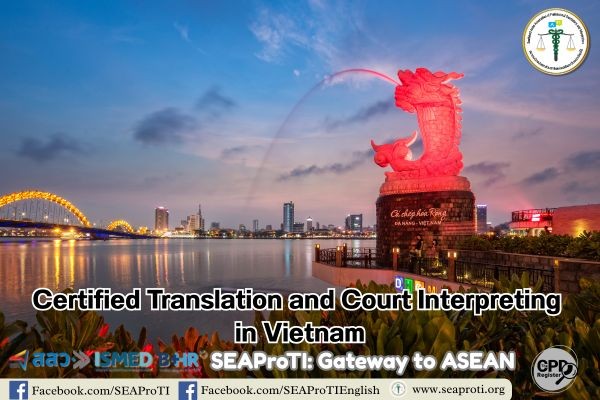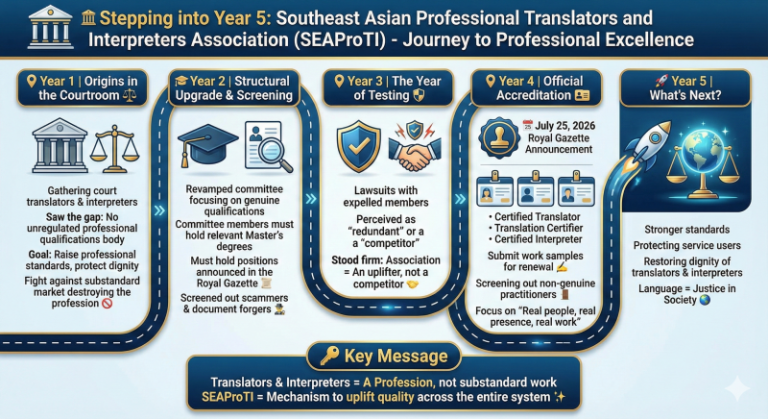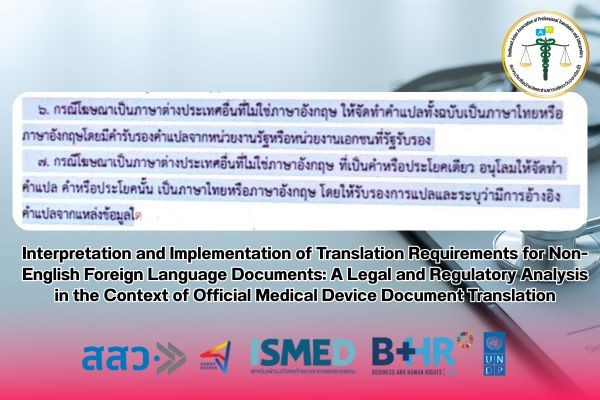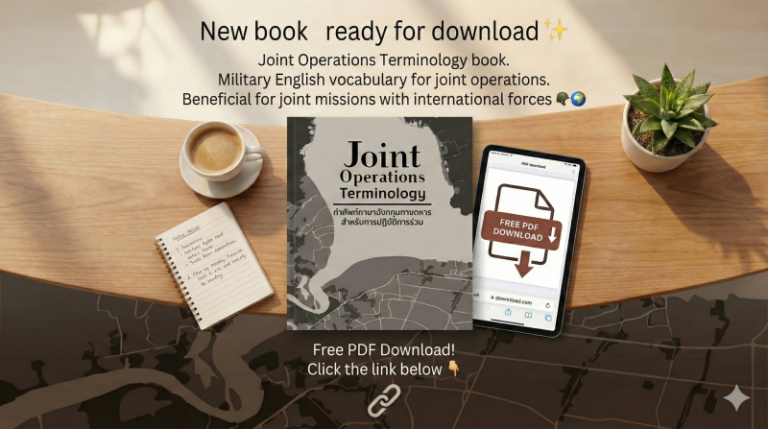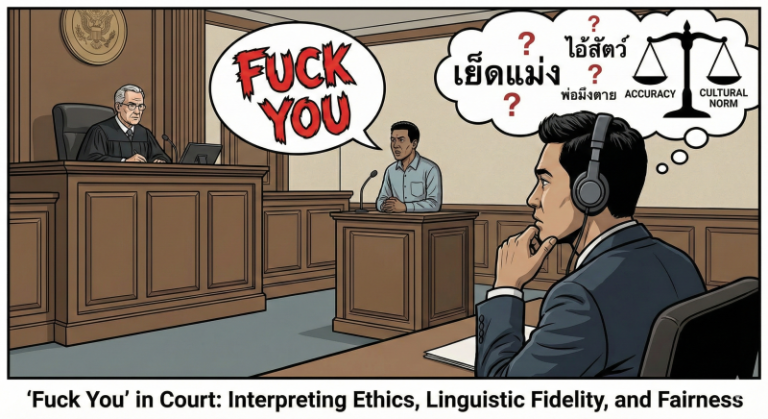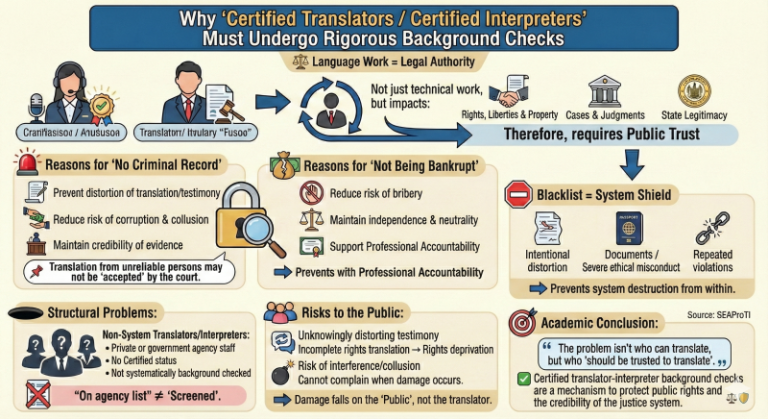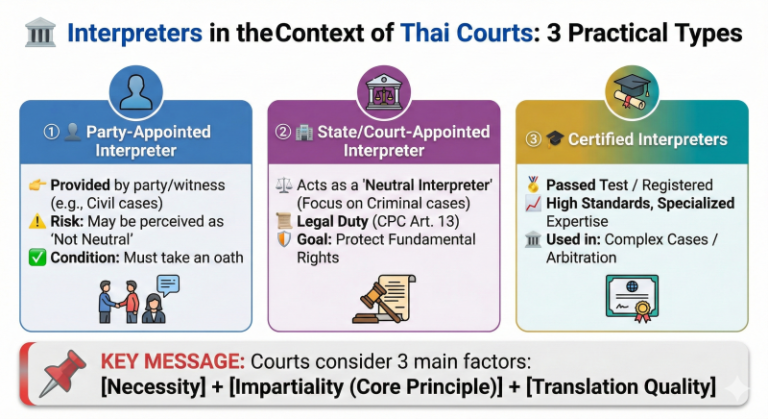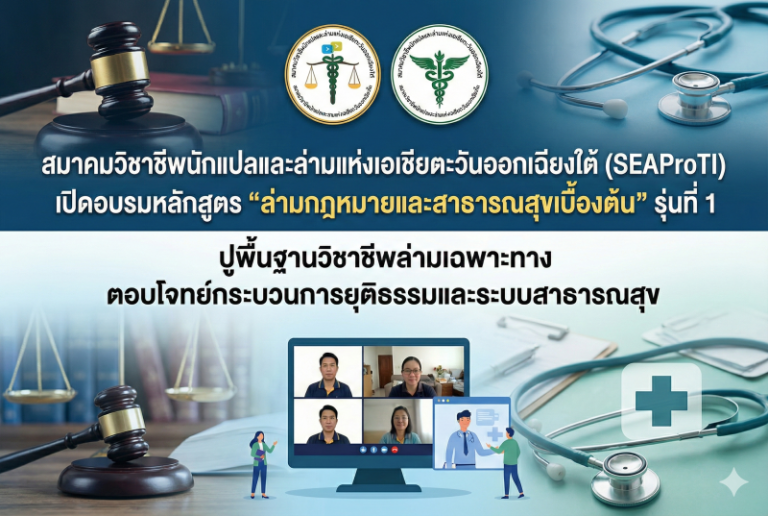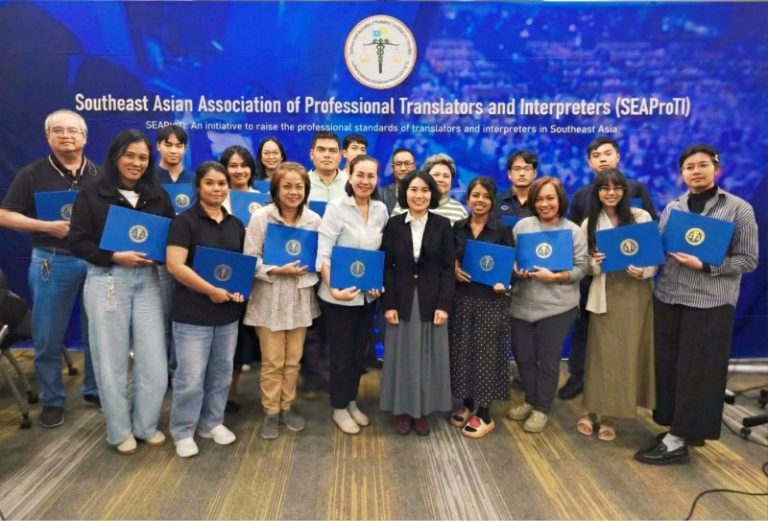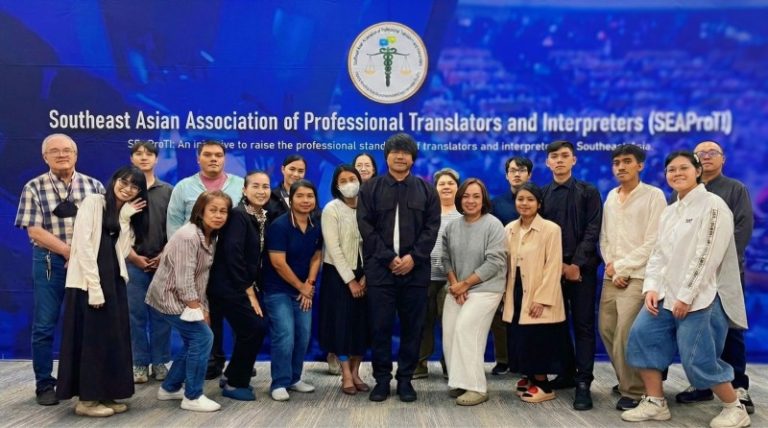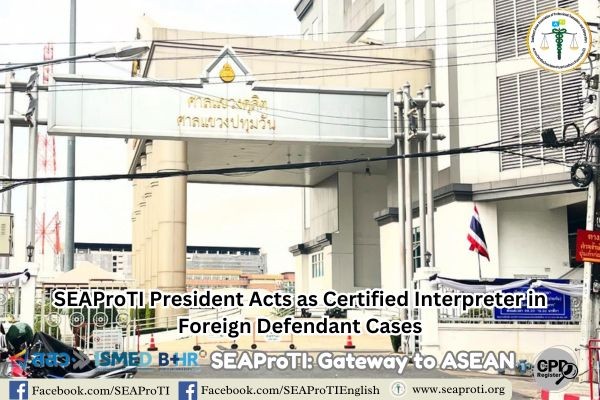Certified Translation and Court Interpreting in Vietnam:
Legal Framework and Professional Practice
12 October 2025, Bangkok – This article examines the legal framework and professional standards governing certified translation and court interpreting in Vietnam. It explores the processes of translation, authentication, notarization, and registration with justice offices, as well as the qualifications and ethical obligations of sworn court interpreters. The analysis highlights Vietnam’s hybrid system that integrates linguistic competence with legal formalities to ensure the authenticity and legal validity of translated documents and interpreted testimony.
In Vietnam, translation and interpreting are not merely linguistic services but legal functions governed by the Law on Notarization (No. 53/2014/QH13) and relevant decrees of the Ministry of Justice. Certified translation, known locally as “dịch thuật công chứng”, refers to translations that have been notarized or authenticated by a justice office (Phòng Tư Pháp) to ensure their legal validity. Similarly, court interpreting (phiên dịch viên tuyên thệ) is recognized as a formal role in judicial proceedings, requiring interpreters to maintain impartiality, accuracy, and professional ethics.
Certified Translation: Legal Basis and Procedures
1. Definition and Legal Standing
Certified translation in Vietnam refers to a translation that has been notarized by an authorized office, ensuring that it faithfully represents the original document. The certification process gives the translation legal effect for submission to courts, embassies, and government agencies (Vietnam Ministry of Justice, 2020).
2. Process of Certification
The process of certified translation typically involves four key steps:
Translation by a Qualified Translator:
The translator must possess sufficient linguistic competence and subject-matter expertise to ensure accuracy.
Translator’s Declaration of Accuracy:
The translator must sign a statement confirming that the translation is true and complete (“I hereby certify that this translation is accurate and complete to the best of my knowledge”).
Registration of Translator’s Signature:
Translators providing notarized translations must register their signatures with the local Justice Office (Phòng Tư Pháp), which maintains an official record of authorized translators (Vietnam Ministry of Justice, 2020).
Notarization and Certification by Justice Office:
The Justice Office verifies the translator’s registration and the authenticity of the original document, then affixes an official seal to certify the translation.
When the translated document is intended for international use, it may also require legalization by the Consular Department of the Ministry of Foreign Affairs or an Apostille (for countries party to the Hague Convention).
Document Translation Practices in Vietnam
Translation companies in Vietnam often specialize in certified or notarized translation (dịch thuật công chứng), particularly for documents such as:
- Birth and marriage certificates
- Diplomas, transcripts, and academic records
- Business licenses, contracts, and corporate documents
- Court judgments and legal instruments
Many professional agencies operate under ISO 17100 (Translation Services Management System) and ISO 9001 (Quality Management System) standards (Day Translations, 2023). The focus is on accuracy, confidentiality, and compliance with both domestic and international legal standards.
Uncertified translations (dịch không công chứng) may serve informational purposes but lack legal force in official proceedings (Move to Asia, 2023). Therefore, certified translation remains indispensable in legal, immigration, and corporate contexts.
Court Interpreting in Vietnam
1. Role and Legal Recognition
Court interpreters (phiên dịch viên tuyên thệ) in Vietnam serve as linguistic officers who ensure the defendant’s and litigants’ right to understand and participate in judicial proceedings. Under the Criminal Procedure Code (2015), interpreters must be present whenever a participant in a case does not speak Vietnamese fluently.
2. Qualifications and Ethical Standards
- Court interpreters must:
- Possess verified linguistic competence in Vietnamese and the relevant foreign language;
- Have knowledge of legal terminology and court procedures;
- Demonstrate impartiality and confidentiality; and
- Take an oath of accuracy before the court (tuyên thệ trung thực).
Court interpreting in Vietnam closely parallels the “sworn interpreter” model found in civil law jurisdictions such as France and Germany, where interpreters are formally appointed and bear legal responsibility for accuracy (Dịch Thuật Á Châu, 2022).
Challenges and Professionalization
Although Vietnam has established legal mechanisms for certified translation and court interpreting, several challenges remain:
- Lack of standardized national accreditation for translators and interpreters;
- Variation in local implementation of justice office regulations;
- Limited awareness among clients and agencies regarding notarization requirements; and
- Need for continuing professional development (CPD) to enhance interpreters’ ethical and legal literacy.
Professional associations such as the Vietnamese Translators Association (VTA) and SEAProTI are working toward regional standardization, peer certification, and ASEAN-wide recognition of language professionals (SEAProTI, 2024).
Conclusion
Vietnam’s framework for certified translation and court interpreting exemplifies a hybrid model—combining linguistic accuracy with procedural legality. By integrating translator registration, justice office notarization, and sworn interpreting practices, Vietnam ensures that translated documents and court communications are both accurate and legally binding. Strengthening accreditation systems, CPD programs, and ethical oversight will be essential for sustaining professional integrity and international recognition in this growing field.
References
- Day Translations. (2023). Vietnamese translation services: Certified and professional translators. Retrieved from https://www.daytranslations.com/languages/vietnamese
- Dịch Thuật Á Châu. (2022). Court interpreting in Vietnam. Retrieved from https://dichthuatachau.com/en/court-interpretation.html
- Move to Asia. (2023). Notary and translation in Vietnam. Retrieved from https://movetoasia.com/en/vietnam/notary
- SEAProTI. (2024). Regional peer certification and professional standards for translators and interpreters in Southeast Asia. Bangkok: Southeast Asian Association of Professional Translators and Interpreters.
- Vietnam Ministry of Justice. (2020). Law on Notarization No. 53/2014/QH13 and implementing decrees. Hanoi: Government of Vietnam.
About Certified Translators, Translation Certifiers, and Certified Interpreters of SEAProTI
The Southeast Asian Association of Professional Translators and Interpreters (SEAProTI) has formally announced the qualifications and requirements for registration of Certified Translators, Translation Certification Providers, and Certified Interpreters in Sections 9 and 10 of the Royal Gazette, published by the Secretariat of the Cabinet, Office of the Prime Minister of Thailand, on 25 July 2024 (Vol. 141, Part 66 Ng, p. 100). Certified Translators, Translation Certification Providers, and Certified Interpreters
The Council of State has proposed the enactment of a Royal Decree, granting registered translators and recognized translation certifiers from professional associations or accredited language institutions the authority to provide legally valid translation certification (Letter to SEAProTI dated April 28, 2025)
SEAProTI is the first professional association in Thailand and Southeast Asia to implement a comprehensive certification system for translators, certifiers, and interpreters.
Head Office: Baan Ratchakru Building, No. 33, Room 402, Soi Phahonyothin 5, Phahonyothin Road, Phaya Thai District, Bangkok 10400, Thailand
Email: hello@seaproti.com | Tel.: (+66) 2-114-3128 (Office hours: Mon–Fri, 09:00–17:00)
การรับรองการแปลและการล่ามศาลในประเทศเวียดนาม: กรอบกฎหมายและแนวปฏิบัติทางวิชาชีพ
(Certified Translation and Court Interpreting in Vietnam: Legal Framework and Professional Practice)
12 ตุลาคม 2568, กรุงเทพมหานคร -บทความนี้ศึกษากรอบกฎหมายและมาตรฐานวิชาชีพที่ใช้ในการกำกับดูแลการแปลเอกสารที่ได้รับการรับรอง (Certified Translation) และการล่ามศาล (Court Interpreting) ในประเทศเวียดนาม โดยวิเคราะห์กระบวนการรับรองการแปล การตรวจสอบโดยสำนักงานยุติธรรม (Justice Office) ตลอดจนคุณสมบัติและจรรยาบรรณของล่ามศาล บทความชี้ให้เห็นว่าระบบของเวียดนามมีลักษณะ “ผสมผสาน” ระหว่างความสามารถทางภาษาและขั้นตอนทางกฎหมาย เพื่อรับรองความถูกต้องและผลทางกฎหมายของเอกสารแปลและการถ่ายทอดคำให้การในศาล
ในประเทศเวียดนาม งานแปลและงานล่ามมิได้ถูกมองเพียงในฐานะ “บริการทางภาษา” แต่ยังถือเป็นกิจกรรมทางกฎหมายภายใต้พระราชบัญญัติว่าด้วยการรับรองเอกสาร (Law on Notarization No. 53/2014/QH13) และข้อบังคับที่เกี่ยวข้องของกระทรวงยุติธรรม (Ministry of Justice)
การแปลที่ได้รับการรับรอง (dịch thuật công chứng) หมายถึงการแปลที่ได้รับการตรวจสอบและประทับตรารับรองจากสำนักงานยุติธรรม (Phòng Tư Pháp) เพื่อให้มีผลทางกฎหมาย เช่นเดียวกัน การล่ามศาล (phiên dịch viên tuyên thệ) ถือเป็นตำแหน่งทางกระบวนการยุติธรรมที่ต้องอาศัยความเป็นกลาง ความถูกต้อง และจรรยาบรรณอย่างเคร่งครัด
การรับรองการแปล: กรอบกฎหมายและขั้นตอน
1. ความหมายและสถานะทางกฎหมาย
การแปลที่ได้รับการรับรองในเวียดนาม หมายถึงการแปลที่ผ่านการตรวจสอบและรับรองโดยสำนักงานยุติธรรม เพื่อยืนยันว่าเนื้อหาที่แปลตรงตามต้นฉบับ เอกสารลักษณะนี้จึงสามารถนำไปใช้ในศาล หน่วยงานราชการ หรือสถานทูตได้ (Vietnam Ministry of Justice, 2020)
2. กระบวนการรับรอง
กระบวนการแปลและรับรองเอกสารในเวียดนามแบ่งได้เป็น 4 ขั้นตอนหลัก ได้แก่
- การแปลโดยผู้แปลที่มีคุณสมบัติ (Qualified Translator):
ผู้แปลต้องมีความรู้ด้านภาษาและสาขาวิชาที่เกี่ยวข้อง เพื่อให้การแปลถูกต้องสมบูรณ์
- การลงนามรับรองความถูกต้องของผู้แปล (Translator’s Declaration):
ผู้แปลต้องลงชื่อรับรองข้อความ เช่น “ข้าพเจ้าขอรับรองว่าการแปลฉบับนี้ถูกต้องครบถ้วนตรงตามต้นฉบับ”
- การขึ้นทะเบียนลายเซ็นผู้แปลกับสำนักงานยุติธรรม (Signature Registration):
ผู้แปลที่ต้องการให้สำนักงานยุติธรรมรับรองผลงานแปลต้องลงทะเบียนลายเซ็นไว้กับสำนักงานยุติธรรมท้องถิ่น (Phòng Tư Pháp) (Vietnam Ministry of Justice, 2020)
การรับรองโดยสำนักงานยุติธรรม (Notarization):
เจ้าหน้าที่สำนักงานยุติธรรมจะตรวจสอบเอกสารต้นฉบับและลายเซ็นของผู้แปล จากนั้นประทับตรารับรองอย่างเป็นทางการเพื่อให้เอกสารแปลมีผลทางกฎหมาย
📜 หากเอกสารนั้นต้องใช้ในต่างประเทศ จำเป็นต้องผ่านการ “Legalization” ที่กระทรวงการต่างประเทศเวียดนาม หรือการ “Apostille” หากประเทศปลายทางเป็นภาคีอนุสัญญาเฮก (Hague Convention)
การแปลเอกสารในทางปฏิบัติ (Document Translation Practices)
บริษัทแปลในเวียดนามจำนวนมากให้บริการ “การแปลและรับรองเอกสาร” (dịch thuật công chứng) ซึ่งมักใช้กับเอกสารทางราชการและเอกสารส่วนบุคคล เช่น
- สูติบัตร / ทะเบียนสมรส / ใบเปลี่ยนชื่อ
- ปริญญาบัตร / ใบแสดงผลการศึกษา
- หนังสือรับรองบริษัท / สัญญาทางธุรกิจ
- คำพิพากษา / คำสั่งศาล
บริษัทแปลชั้นนำมักดำเนินงานภายใต้มาตรฐานสากล เช่น ISO 17100 (Translation Services) และ ISO 9001 (Quality Management System) (Day Translations, 2023) เพื่อรับรองคุณภาพและความถูกต้องตามหลักจรรยาบรรณวิชาชีพ
การแปลที่ไม่ได้รับการรับรอง (dịch không công chứng) ใช้ได้เพียงในทางข้อมูลทั่วไป ไม่สามารถยื่นเป็นหลักฐานทางกฎหมาย (Move to Asia, 2023) ดังนั้น การรับรองการแปลจึงเป็นขั้นตอนสำคัญที่จำเป็นต่อการยื่นเอกสารในศาล หน่วยงานรัฐ หรือองค์กรระหว่างประเทศ
การล่ามศาลในเวียดนาม (Court Interpreting)
1. บทบาทและสถานะทางกฎหมาย
ล่ามศาลในเวียดนาม (phiên dịch viên tuyên thệ) ทำหน้าที่เป็นผู้ถ่ายทอดภาษาให้แก่คู่ความในคดีที่ไม่สามารถใช้ภาษาเวียดนามได้อย่างคล่องแคล่ว ตามประมวลกฎหมายวิธีพิจารณาความอาญา พ.ศ. 2015 (Criminal Procedure Code 2015) ศาลมีหน้าที่จัดให้มีล่ามทุกครั้งที่จำเลยหรือคู่ความไม่สามารถเข้าใจภาษาได้อย่างครบถ้วน
2. คุณสมบัติและจรรยาบรรณ
ล่ามศาลในเวียดนามต้องมีคุณสมบัติดังนี้:
- ความสามารถด้านภาษาเวียดนามและภาษาต่างประเทศที่เกี่ยวข้อง
- ความรู้ด้านศัพท์กฎหมายและกระบวนการพิจารณาคดี
- ความเป็นกลาง ไม่ลำเอียง และรักษาความลับของคู่ความ
- ต้องสาบานตนต่อศาลว่าจะล่ามด้วยความซื่อสัตย์ (tuyên thệ trung thực)
ระบบนี้คล้ายคลึงกับ “ล่ามสาบานตน (Sworn Interpreter)” ในประเทศฝรั่งเศสและเยอรมนี ซึ่งล่ามมีหน้าที่ตามกฎหมายและความรับผิดชอบโดยตรงต่อศาล (Dịch Thuật Á Châu, 2022)
ความท้าทายและการพัฒนาในอนาคต
แม้ประเทศเวียดนามจะมีกรอบกฎหมายรองรับการแปลและล่ามอย่างเป็นทางการ แต่ยังมีความท้าทายหลายประการ ได้แก่
- ขาดระบบรับรองวิชาชีพแห่งชาติ (Accreditation) ที่เป็นมาตรฐานเดียว
- การบังคับใช้กฎหมายของสำนักงานยุติธรรมแตกต่างกันในแต่ละจังหวัด
- ผู้ใช้บริการบางส่วนยังไม่เข้าใจขั้นตอนการรับรองอย่างถูกต้อง
- ความจำเป็นในการพัฒนาวิชาชีพอย่างต่อเนื่อง (CPD) เพื่อยกระดับมาตรฐานจรรยาบรรณ
องค์กรวิชาชีพ เช่น Vietnamese Translators Association (VTA) และ SEAProTI กำลังดำเนินการผลักดันการรับรองแบบ Peer Certification และสร้างมาตรฐานร่วมระดับอาเซียน เพื่อให้ผู้ประกอบวิชาชีพด้านภาษาได้รับการยอมรับในระดับภูมิภาค (SEAProTI, 2024)
บทสรุป
ระบบการแปลและการล่ามในเวียดนามเป็นตัวอย่างของ “ระบบผสมผสาน” ระหว่างความสามารถทางภาษาและความชอบด้วยกฎหมาย กระบวนการขึ้นทะเบียนผู้แปล การรับรองโดยสำนักงานยุติธรรม และการล่ามสาบานตนในศาล ล้วนมุ่งให้การสื่อสารทางกฎหมายเป็นไปอย่างถูกต้องและโปร่งใส การพัฒนามาตรฐานวิชาชีพ การอบรมต่อเนื่อง และการกำกับจรรยาบรรณอย่างเข้มแข็ง จะเป็นปัจจัยสำคัญที่ทำให้ระบบนี้ได้รับการยอมรับในระดับนานาชาติ
เอกสารอ้างอิง
- Day Translations. (2023). Vietnamese translation services: Certified and professional translators. สืบค้นจาก https://www.daytranslations.com/languages/vietnamese
- Dịch Thuật Á Châu. (2022). Court interpreting in Vietnam. สืบค้นจาก https://dichthuatachau.com/en/court-interpretation.html
- Move to Asia. (2023). Notary and translation in Vietnam. สืบค้นจาก https://movetoasia.com/en/vietnam/notary
- SEAProTI. (2024). Regional peer certification and professional standards for translators and interpreters in Southeast Asia. กรุงเทพฯ: สมาคมวิชาชีพนักแปลและล่ามแห่งเอเชียตะวันออกเฉียงใต้
- Vietnam Ministry of Justice. (2020). Law on Notarization No. 53/2014/QH13 and implementing decrees. ฮานอย: กระทรวงยุติธรรมเวียดนาม
เกี่ยวกับนักแปลรับรอง ผู้รับรองการแปล และล่ามรับรองของสมาคมวิชาชีพนักแปลและล่ามแห่งเอเชียตะวันออกเฉียงใต้
สมาคมวิชาชีพนักแปลและล่ามแห่งเอเชียตะวันออกเฉียงใต้ (SEAProTI) ได้ประกาศหลักเกณฑ์และคุณสมบัติผู้ที่ขึ้นทะเบียนเป็น “นักแปลรับรอง (Certified Translators) และผู้รับรองการแปล (Translation Certification Providers) และล่ามรับรอง (Certified Interpreters)” ของสมาคม หมวดที่ 9 และหมวดที่ 10 ในราชกิจจานุเบกษา ของสำนักเลขาธิการคณะรัฐมนตรี ในสำนักนายกรัฐมนตรี แห่งราชอาณาจักรไทย ลงวันที่ 25 ก.ค. 2567 เล่มที่ 141 ตอนที่ 66 ง หน้า 100 อ่านฉบับเต็มได้ที่: นักแปลรับรอง ผู้รับรองการแปล และล่ามรับรอง
สำนักคณะกรรมการกฤษฎีกาเสนอให้ตราเป็นพระราชกฤษฎีกา โดยกำหนดให้นักแปลที่ขึ้นทะเบียน รวมถึงผู้รับรองการแปลจากสมาคมวิชาชีพหรือสถาบันสอนภาษาที่มีการอบรมและขึ้นทะเบียน สามารถรับรองคำแปลได้ (จดหมายถึงสมาคม SEAProTI ลงวันที่ 28 เม.ย. 2568)
สมาคมวิชาชีพนักแปลและล่ามแห่งเอเชียตะวันออกเฉียงใต้ เป็นสมาคมวิชาชีพแห่งแรกในประเทศไทยและภูมิภาคเอเชียตะวันออกเฉียงใต้ที่มีระบบรับรองนักแปลรับรอง ผู้รับรองการแปล และล่ามรับรอง
สำนักงานใหญ่: อาคารบ้านราชครู เลขที่ 33 ห้อง 402 ซอยพหลโยธิน 5 ถนนพหลโยธิน แขวงพญาไท เขตพญาไท กรุงเทพมหานคร 10400 ประเทศไทย
อีเมล: hello@seaproti.com โทรศัพท์: (+66) 2-114-3128 (เวลาทำการ: วันจันทร์–วันศุกร์ เวลา 09.00–17.00 น.)


